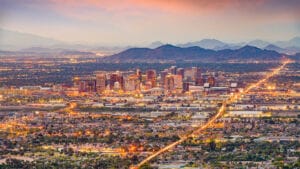During the first three months of the year, more than 14,000 jobs were added in Arizona’s tourism and hospitality industry, and in March metropolitan Phoenix had the No. 1 occupancy rate among the top 25 markets in the United States.
So it’s no wonder Arizona Gov. Doug Ducey and the Arizona Office of Tourism are enthusiastic about celebrating National Travel and Tourism Week, which begins May 7.
“Tourism is Arizona’s No. 1 export and one of the state’s strongest economic pillars,” said Gov. Ducey, who officially proclaimed May 7-13 as Arizona Travel and Tourism Week. “Tourism creates tens of thousands of jobs in our state and brings in billions of dollars in tax revenue.”
According to a 2016 study by the economic-research firm Dean Runyan Associates, visitors to Arizona collectively spend $58 million each day—that’s about $40,000 per minute. Visitor spending sustains 180,000 jobs in the state and reduces the average Arizona household’s annual tax burden by about $1,200.
The latest employment report from Arizona’s Office of Economic Opportunity showed that the leisure and hospitality sector added 14,200 jobs through the first three months of 2017—the strongest growth of any business sector in the state.
The tourism industry in Arizona supports more jobs than the banking industry, the insurance industry, the real estate industry, the manufacturing industry, the construction industry or the mining industry.
“Tourism helps create jobs in another way, too: It’s the front door to economic development and business relocation,” said Debbie Johnson, director of the Arizona Office of Tourism. “Our marketing efforts showcase many of the assets—iconic landscapes, beautiful weather, outdoor living—that make Arizona the best place in the country to live, work and play.”
The state’s marketing efforts seem to be working.
Bolstered by record attendance at Cactus League Spring Training, metro Phoenix—the largest hotel market in the state—posted an 88 percent occupancy rate for the month of March. That was the highest occupancy rate among the nation’s top 25 markets, according to Smith Travel Research. Arizona had the second-highest occupancy rate among the 50 states in March.
Phoenix’s hosting of the NCAA Men’s Final Four increased visitation in April. Recent analysis of Smith Travel Research data by Hotel News Now showed that Phoenix hotels experienced a 29 percent occupancy increase during Final Four weekend (compared to the average of every weekend for the prior year). During Final Four game days Phoenix hotels got higher rates ($209 average) than every other market in the U.S. except Oahu, Hawaii, which helped drive revenue per available room up 127 percent.
The Arizona tourism industry’s strong start to the first quarter of 2017 follows a year in which both Arizona’s state parks and its most-visited national park recorded record visitation. More than 2.6 million people visited Arizona State Parks in 2016, contributing $16.4 million in revenue to the parks system.
Meanwhile, Grand Canyon National Park welcomed 5.96 million visitors in 2016, an 8.1 percent jump over the previous year. According to a new Department of the Interior report, the 18 national parks and monuments in Arizona generate nearly $1 billion in visitor spending and support more than 15,000 jobs.



